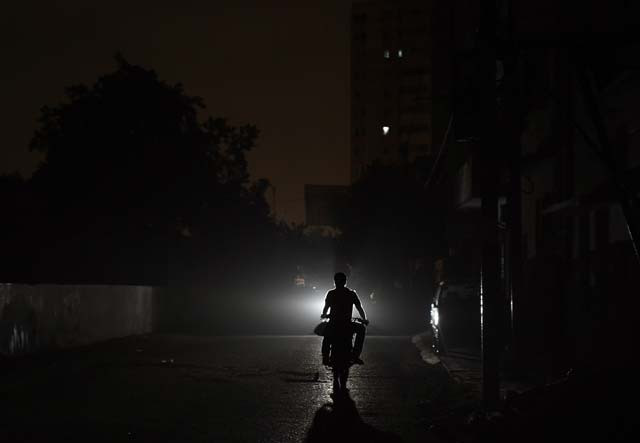Loadshedding woes: Sizzling sun keeps govt on the tenterhooks
PM Abbasi reviews strategy to tackle power outages

PHOTO: AFP
Ahead of the upcoming elections, the federal authorities are now reviewing the strategy to minimise loadshedding hours even in areas that have been witnessing high line losses, The Express Tribune has learnt.
Not long ago, the federal government ran advertisements in the media, claiming credit for not only ending loadshedding, but also producing surplus power.
PTI rubbishes govt's 'zero loadshedding' claim
PM Abbasi reiterated on different public occasions that the federal government ensured ‘zero loadshedding’ across the country.
Later, following persistent power outages in different areas, the federal government reviewed the policy and announced that zero loadshedding would be observed in areas where line losses — including those from power theft — were either nil or very low.
The areas where the line losses were high would see loadshedding on a regular basis as per the schedules. However, after the rise in temperature that increased power demand and caused prolonged loadshedding spells in different parts of the country, the government is set to review its existing policy in a bid to avoid public outrage, according to sources.
A government official, who wished to be kept unnamed, described the government policy to increase power outages in the areas having high line losses as ‘principled’, but said it was brewing problems for the government given that numerous areas throughout Pakistan were witnessing high line losses.
Those include major cities and rural areas in the four provinces, the Federally Administered Tribal Areas, Gilgit-Baltistan and Azad Jammu and Kashmir. “Some decisions are principled but entail adverse political implications,” he said.
The government, he said, could not afford continuing with lengthy loadshedding timings ahead of the general elections as this would negatively affect the vote bank of the Pakistan Muslim League-Nawaz.
“Logically, continuing with prolong loadshedding in the areas witnessing high line losses is the best practicable option. But under the prevailing circumstances, the matter entails political dimensions and we need to do something about it,” he said.
To respond to the situation, he added, the prime minister had reportedly directed power officials to make sure that the government’s early claim of ensuring zero loadshedding throughout the country was materialised in letter and spirit regardless of the extent of line losses.
“The advent of scorching summer in March that triggered elongated power outages implies that things would get worse in the days to come. Damage control is necessary,” the official, who is also a parliamentarian, said.
We achieved success in overcoming load-shedding crisis due to govt policies: PM
The government source said the ruling lot was expecting a respite from power outages in the summer given that the monsoon rains could boost hydel power generation.
A few months ago, the prime minister took steps in a bid to curb unannounced power outages. The steps included action against heads of those grid stations where unannounced loadshedding was persistent.
After assuming the charge on August 1 last year, PM Abbasi had established the Ministry of Energy, comprising power and petroleum divisions, in a bid to improve functioning, but reportedly remains concerned about the loadshedding problem.



















COMMENTS
Comments are moderated and generally will be posted if they are on-topic and not abusive.
For more information, please see our Comments FAQ